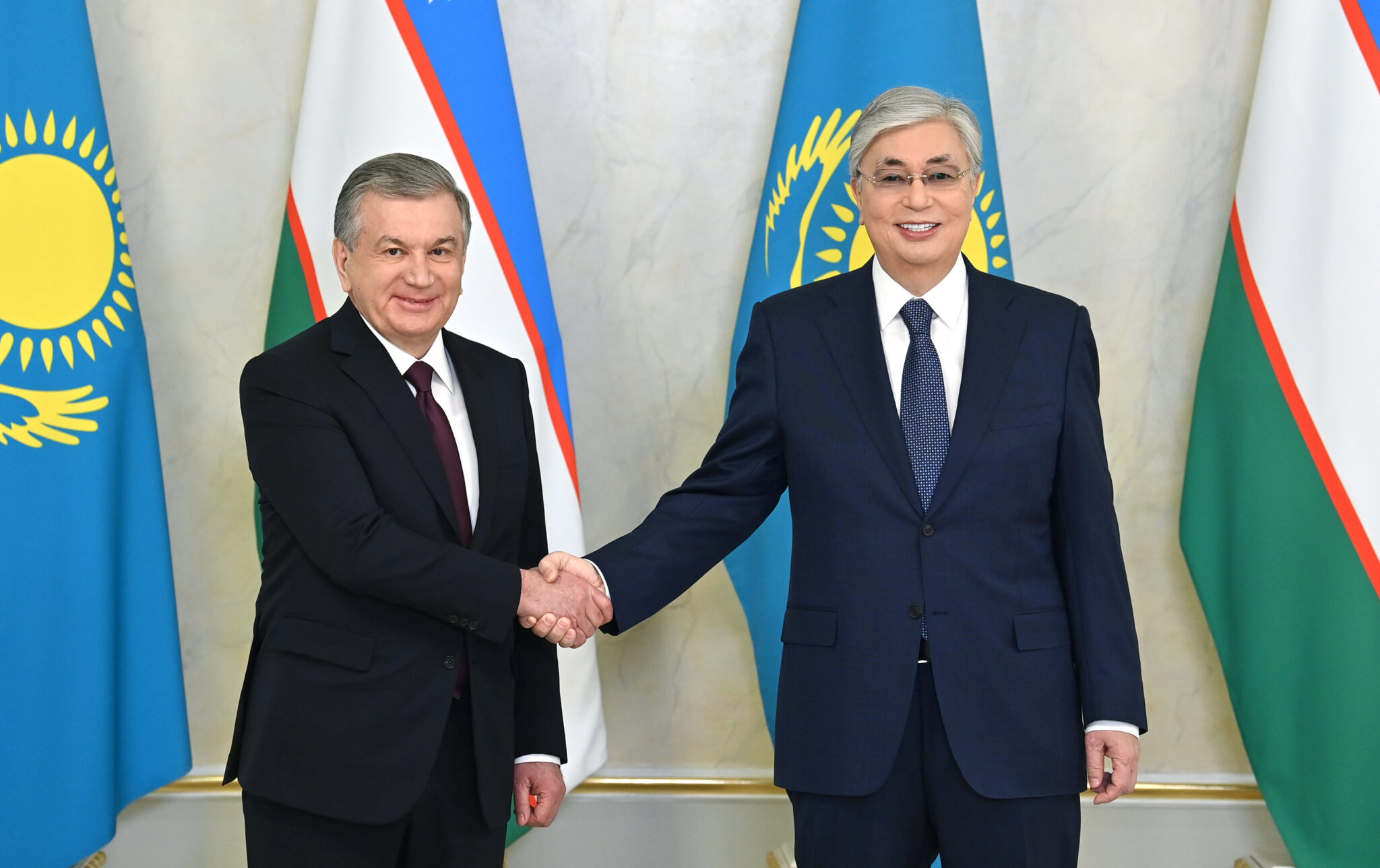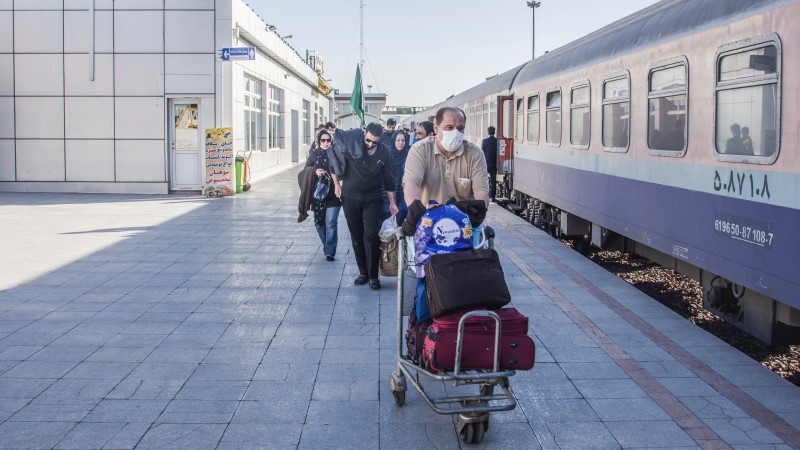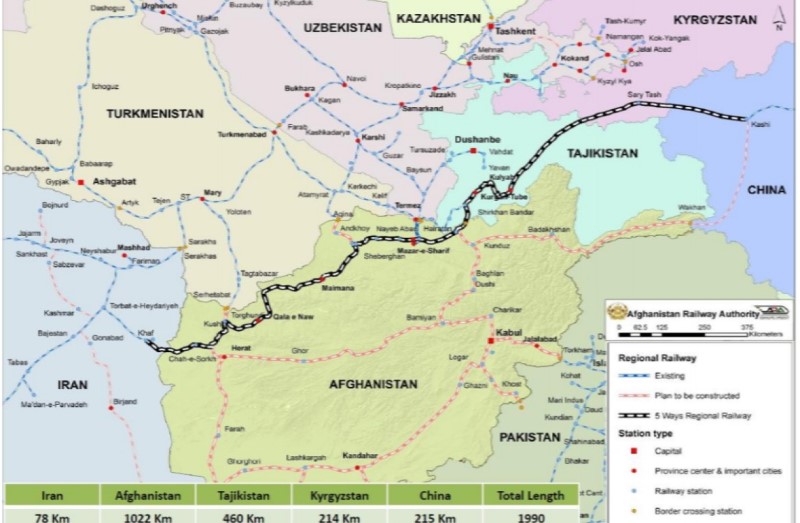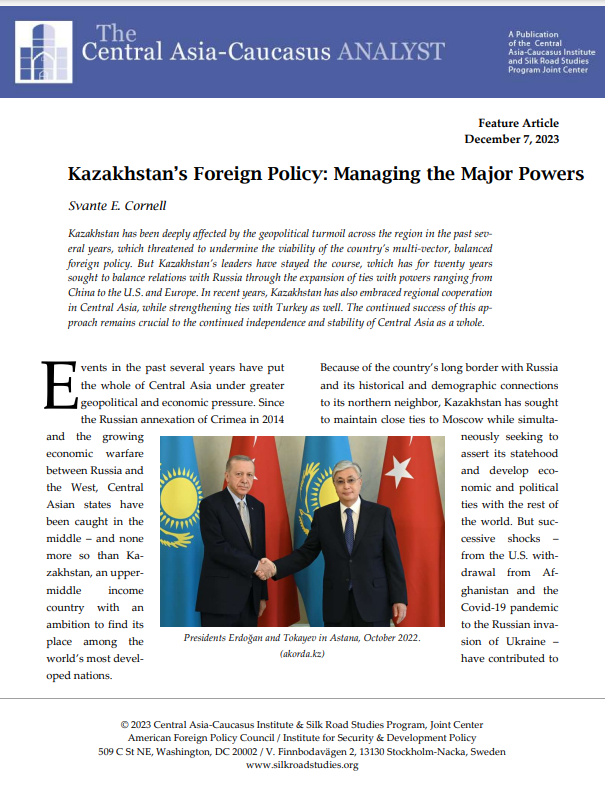Tokayev's Strategy: Balancing Regional Cooperation and Global Ambitions
By Emma Krdzalic
In the heart of Central Asia, Kazakhstan has been steadily asserting itself as a regional powerhouse. At the sixth consultative meeting of Central Asian leaders in Astana in August 2024, President Kassym-Jomart Tokayev convened with his counterparts from Kyrgyzstan, Tajikistan, Turkmenistan, and Uzbekistan to discuss regional unity and a shared vision for the future. This pivotal gathering, which produced the ambitious “Central Asia – 2040” development concept, was a testament to the groundwork Tokayev laid in his 2023 address on sustainable development and prosperity the previous year. His speech then outlined Kazakhstan’s goals of evolving into a stable middle power by fostering deeper cooperation among Central Asian states, and the 2024 summit reinforced his vision with concrete actions and agreements. By merging strategic foresight with regional collaboration, Tokayev is positioning Kazakhstan as a mediator and a leader capable of navigating Central Asia through modern geopolitical challenges.

BACKGROUND: Kazakhstan’s journey to middle-power status has been driven by several factors, including its rich natural resources, strategic location, and a sensible foreign policy that balances relationships with global powers including Russia, China, Iran, and the West. The country’s role as a key player in the Central Asian region is further cemented by its participation in global organizations such as the United Nations, the Eurasian Economic Union (EAEU), Shanghai Cooperation Organization (SCO), Organization of Islamic Cooperation (OIC), North Atlantic Cooperation Council (NACC), Collective Security Treaty Organization (CSTO), and the Commonwealth of Independent States (CIS). However, Kazakhstan faces significant challenges in its role as a mediator and middle power due to the decline of the liberal international order, which has traditionally supported such nations. The erosion of norms that regulate state behavior has diminished Kazakhstan’s ability to act as a mediator in global conflicts, particularly in an era of heightened tensions between Russia and the West. Additionally, increased cooperation among revisionist powers like Russia, China, and Iran further complicates Kazakhstan’s strategic position, as these nations challenge the liberal international system that Kazakhstan relies on. The ongoing economic tensions between Russia and the West have disrupted key trade routes, forcing Kazakhstan to seek costlier alternatives and exacerbating the challenges of being landlocked. Despite these obstacles, Kazakhstan is adapting by leveraging its geographic advantages, strengthening regional partnerships, and exploring new trade routes that may offer fresh opportunities for influence and collaboration. Internally, President Tokayev has demonstrated a keen understanding of Kazakhstan’s challenges, particularly in maintaining political stability and responding to public demands for reform. The events of early 2022, when an attempted coup exposed rifts within the elite, highlighted the need for Tokayev to consolidate power and initiate meaningful reforms. While some steps have been taken to address these challenges, such as regaining control over state institutions and exploring new regional partnerships, the government faces a delicate balancing act. It must navigate the competing interests of various elite groups, respond to public demands for change, and maintain its strategic position in a shifting global landscape. The success of Kazakhstan’s “New Kazakhstan” initiative will largely depend on its ability to implement genuine reforms while maintaining stability and leveraging its geographic advantages in an increasingly complex international environment. While Tokayev has succeeded in regaining control over state institutions, the underlying tensions within the political elite remain, posing long-term challenges to the country’s stability.
IMPLICATIONS: To address these challenges, Tokayev has prioritized reforms aimed at improving governance, expanding human capital development, and enhancing the country’s competitiveness on the global stage. A key aspect of these reforms is Tokayev’s focus on education and culture. Kazakhstan has actively expanded its partnerships with top universities and invited Central Asian youth to study in the country, recognizing the importance of education in fostering innovation and economic growth. This strategy not only builds a more skilled workforce but also strengthens Kazakhstan’s regional influence by creating educational ties with neighboring countries. Pouring resources and effort into this cause, if done well, will ultimately give Kazakhstan long-term solutions and results that not only support the current state of the country but also build an overall more educated population that fosters stability and cooperation within the region. Additionally, Tokayev has called for greater cooperation in information and analytics, suggesting the creation of joint media products and even a pan-regional TV channel or internet news portal. This initiative is part of a broader effort to enhance Kazakhstan's soft power in the region and promote cultural and humanitarian cooperation. By investing in these areas, Tokayev aims to build a more cohesive regional identity while showcasing Kazakhstan as a model for development and modernization. On August 9th, President Tokayev underlined Kazakhstan’s strategic course for strengthening regional partnerships and increasing the role of Central Asia on the global scale at the sixth consultative meeting of Central Asian heads of state. This showed that Kazakhstan, as a middle power, has a unique role in shaping the future of Central Asia. Its geographic location as a bridge between the Caspian Sea and China, coupled with its economic interests across the region, positions Kazakhstan as a key player in the East-West corridor. However, Kazakhstan’s success as a middle power will depend not only on its ability to manage relationships with great powers but also on its cooperation with other regional states. Tokayev proved himself to be making consistent and conscious efforts to promote these ideals in this meeting through his speech, which supported models and roadmaps for continuous cooperation in a variety of sectors for Central Asia. Additionally, Tokayev’s advancements in cooperation with states like Uzbekistan and Azerbaijan support his claim to commit to regional cooperation that would stabilize the Central Asian region. The partnerships with Uzbekistan and Azerbaijan, both of which are emerging as aspiring middle powers, are crucial for the stability and development of Greater Central Asia. These partnerships facilitate trade, security cooperation, and regional integration, while also counterbalancing the influence of larger powers like Russia and China. At the same time, Kazakhstan’s role in stabilizing smaller states in the region, such as Kyrgyzstan and Tajikistan, is essential for maintaining peace and security in Central Asia. Tokayev’s efforts to reinforce Kazakhstan’s influence are evident in his focus on strengthening regional alliances, particularly with Uzbekistan. Recent visits to Astana by Uzbek President Shavkat Mirziyoyev have marked a new era of cooperation between the two countries, leading to strategic partnerships in the trade, transport, energy, and agriculture sectors. The leaders signed key documents, including the 2040 Concept for Regional Development and a roadmap for industrial cooperation, deepening economic and cultural ties. With nearly 70 joint projects valued at over US$ 3 billion and employing 14,000 people, the partnership aims to enhance connectivity and create new trade corridors. Additionally, agreements on water resource management and cultural cooperation for 2024-2025 further highlight the countries’ commitment to regional sustainability and shared values.
CONCLUSIONS: Kazakhstan’s rise as a middle power is a complex balancing act that requires both internal reforms and strategic external partnerships. In his August speech, President Tokayev outlined a clear vision for Kazakhstan’s future, emphasizing sustainable development as a pathway to long-term prosperity. The country’s middle-power status depends on its ability to navigate geopolitical challenges while fostering strong regional alliances, particularly with Uzbekistan, and ensuring internal stability through meaningful reforms. President Tokayev’s response to Kazakhstan’s rise as a middle power reflects a forward-looking strategy emphasizing regional cooperation, domestic reforms, and global engagement. By expanding educational and cultural ties, enhancing cooperation in information and analytics, and strengthening alliances with neighboring countries, Tokayev is positioning Kazakhstan as a key player in the future of Central Asia. However, the challenges posed by geopolitical tensions, economic disruptions, and internal political dynamics remain significant. Tokayev’s ability to navigate these challenges will determine whether Kazakhstan can sustain its middle-power status and continue to play a stabilizing role in the region. Tokayev’s efforts as Kazakhstan moves forward to maintain its middle-power role have not gone unnoticed as Kazakhstan confirms and fortifies its partnerships with countries like Uzbekistan and Azerbaijan, as well as its engagement with Central Asia and the broader international community. The path it remains on will be key to its success in shaping the future of Central Asia and beyond.
AUTHOR’S BIO: Emma Krdzalic is a current intern at the American Foreign Policy Council (AFPC), where she researches National Security dynamics, Russia, Russia-Ukraine, Central Asia, and the Caucasus. She is a student at the University of Georgia, pursuing her studies in International Relations, Political Science, and Russian while interning in Washington, D.C. through the Washington Semester Program.
Kazakhstan’s Foreign Policy: Managing the Major Powers
By Svante E. Cornell
December 8, 2023
Kazakhstan has been deeply affected by the geopolitical turmoil across the region in the past several years, which threatened to undermine the viability of the country’s multi-vector, balanced foreign policy. But Kazakhstan’s leaders have stayed the course, which has for twenty years sought to balance relations with Russia through the expansion of ties with powers ranging from China to the U.S. and Europe. In recent years, Kazakhstan has also embraced regional cooperation in Central Asia, while strengthening ties with Turkey as well. The continued success of this approach remains crucial to the continued independence and stability of Central Asia as a whole.
Chessboard No More: the Rise of Central Asia’s International Agency
By Svante E. Cornell and S. Frederick Starr
October 3, 2023
Central Asia is often portrayed through metaphors such as a “Grand Chessboard” or a “Great Game,” which suggest that the players in the game are the great powers, and the Central Asian states are merely pawns in this game. This might have been a plausible argument thirty years ago. But today, thirty years into independence, it is abundantly clear that Central Asian states have agency at the regional and even global level.

Iran and South Caucasus Railway Connections after the Nagorno-Karabakh War
By Vali Kaleji
July 8, 2021, the CACI Analyst
After the Second Karabakh War, the tripartite ceasefire agreement on November 10, 2020, opens a possibility for Iran to become connected to the southern railway network in the South Caucasus. As a result of the First Nagorno-Karabakh War, an important part of the South Caucasus Railway, which passed through the Nakhichevan region, Syunik Province in southern Armenia, and Jabrail, Fizuli and Zangilan regions in southern Azerbaijan, was destroyed or removed from communication routes. As a result, unlike Turkey and Russia, Iran has no rail connection to the Caucasus.

Iran and Afghanistan Inaugurate Cross-Border Railway
By Sudha Ramachandran
April 27, 2021, the CACI Analyst
A new railway line running between Khaf in Iran and Herat in Afghanistan has generated much optimism in the two countries as it has the potential to boost bilateral travel and trade. The railway link is important to the larger region as well as it is part of the ambitious Five Nation Railway Corridor project. While there are great expectations of the FNRC project and the Khaf-Herat railway link’s recent inauguration in the participating countries, the road ahead will not be easy and the project faces implementation problems as well as competition from rival projects.




